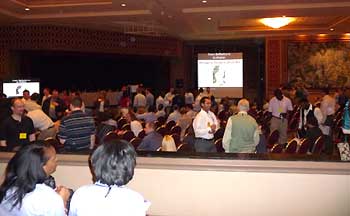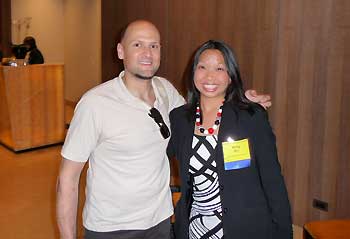
European
Nuclear Society
e-news
Issue 21 Summer 2008
http://www.euronuclear.org/e-news/e-news-21/naygn.htm

280 North American Young Generation Nuclear (NAYGN) members gathered in Chicago recently to attend the 2008 Annual Professional Development Workshop. This year, the central theme of the meeting was Drive Your Success: Train for Tomorrow”. The main focuswere the issues of generational workforce, communications techniques, and knowledge transfer.
The workshop kicked off with a presentation by Chris Crane, Executive Vice President of Exelon Nuclear and Jim Ellis, President and CEO of the Institute of Nuclear Power Plant Operations. Mr. Ellis talked about the positive situation that the nuclear industry is in at the moment. His lecture also identified differences between leadership and management, and how a good manager might not necessarily be a good leader. He added that at this time the nuclear industry needs leadership more than management.

Jack B. Allen, Senior Vice President Operational Excellence Westinghouse Electric Company LLC, discussed how there are different cultures within the nuclear business, and how important is to know and to respect these varying cultures because dealing with people is the foundation of doing business. Even among those that speak the same language there are differences he said: "Americans and British do not speak the same English."
Other speakers clarified the multinational challenge that the nuclear renaissance poses, namely the involvement and interaction of a lot of countries with different cultures. In addition, they stressed how important protocol is in the world of business, for instance, business lunches and dinners are very different affairs for, e.g. Muslims or Japanese businessmen.
The main session of the workshop was chaired by Audrey Nelson, who gave an overview of the situation in North America, where for the first time ever, four (soon to be five) different generations currently work side by side in the same workplace. These are the so-called silent generation, the baby boomers, generation X and generation Y. The main problem with mixture of different generations is the difference in values, and how using new technologies in the workplace is modifying the behaviour and relationships between managers and employees. The session set aside a lot of time for networking and working in groups. Ms. Nelson suggested that generation Y members analyse how they use voicemail and e-mail services compared to a telephone. The main purpose was to point out that the younger generations are losing personal contact by using the new technologies and that they must continue to understand the other generations if they are to succeed.
The workshop ended with a session on knowledge transfer. This focused on how institutions such as NRC are implementing programmes for successfully transferring knowledge. The speakers highlighted how flexibility, above all, was a key to this successful transfer of knowledge. It was also stressed that the word “programme” should not be used within the context of transfer of knowledge as all programmes have their faults and the word implies schedules and knowledge, whereas successful knowledge transfer needs flexibility.

The NAYGN is an association that is made up of chapters all over North America. Any organisation involved in the nuclear industry can start up its own regional chapter within NAYGN and a budget is provided by the founding organisation. For instance, the Pittsburgh chapter is shared by Westinghouse and First Energy active in the region. Nevertheless, some utilities like Progress Energy or Southern Nuclear each have four NAYGN chapters in their organisation due to their locations. Perhaps, this could be the reason why 80-85% of the NAYGN members who attended the conference were members of utilities, while the rest were members of vendors and regulatory bodies.
Based on this experience, it is concluded that American utilities are providing great support for these young professionals. And in return the enthusiasm that this young generation is showing with the new nuclear projects it is involved in in the United States is indeed worthy of admiration.
Miguel Millán, Spanish YGN
© European Nuclear Society, 2008